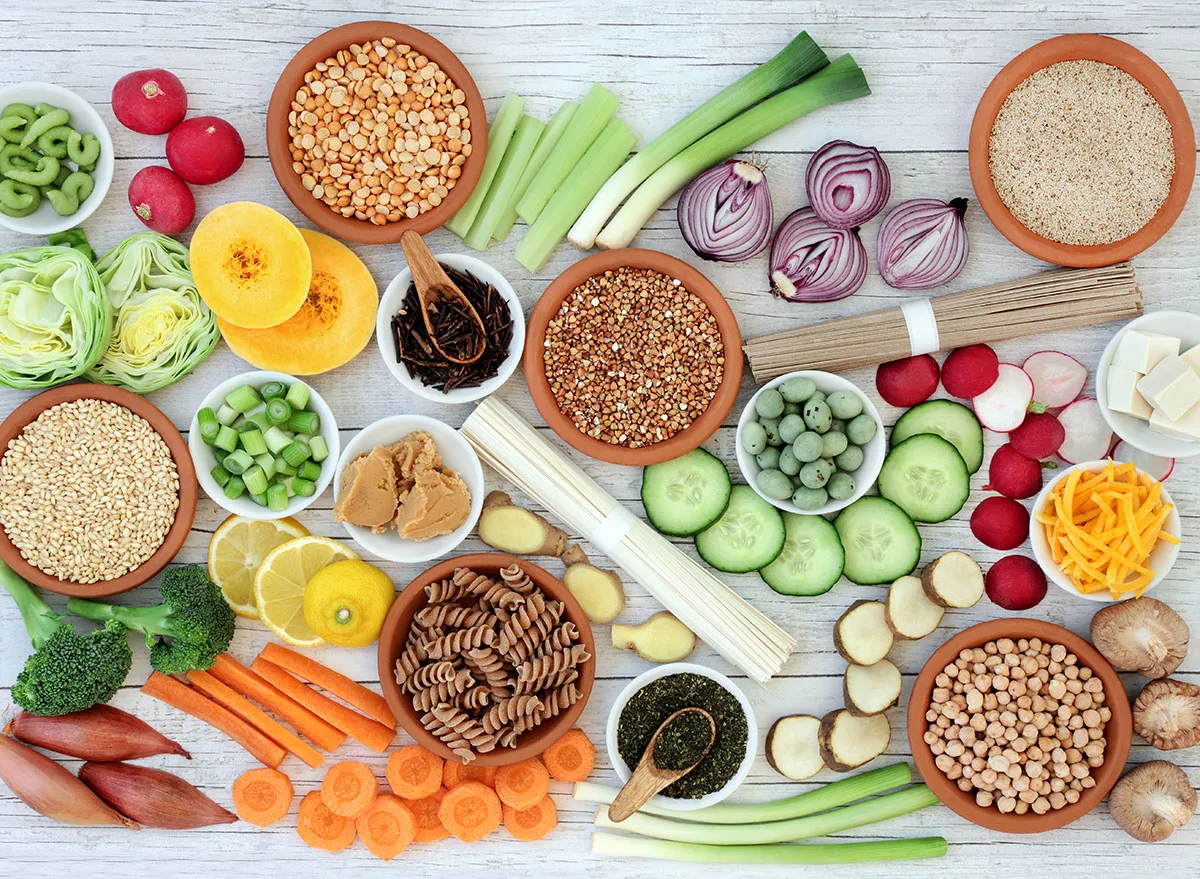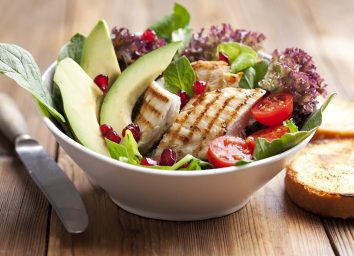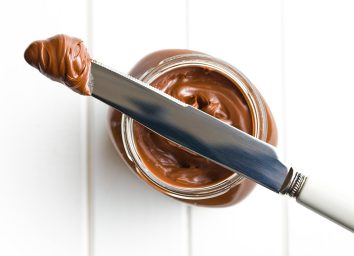Macrobiotic Diet: The Pros and Cons of Eating the Zen Way

Newton’s Third Law states that with every action, there is an equal and opposite reaction. In ancient Chinese philosophy, this concept is referred to as Yin and Yang. According to the Ancient History Encyclopedia, everything in the universe has a polar, yet inseparable opposite. Without one or the other, there would be no balance — in nature, in society, and, especially, in the human body. It is believed that the most optimal way to achieve balance in the mind and spirit is to start with the body. This is where the macrobiotic diet might come in handy.
Alex C. Wilson, an Ayurveda specialist, wellness coach, and yoga instructor at Alex C. Wilson Wellness, says the macrobiotic diet is rooted in the Ayurvedic belief that food should be treated as medicine, and that eating in certain ways will “bring health and balance” into the body. It is a natural, nature-based way of eating derived from Zen Buddhism.
“The goal of eating a macrobiotic diet according to Zen Buddhism is to bring balance to the Yin and Yang qualities—aka the opposing forces—that exist in everything, including the human body,” Wilson says. In order to do so, a person following the macrobiotic diet would only “consume whole foods that are naturally sourced from the area in which they live, while eliminating the intake of land animal products.” The end goal is to harmonize the balance of Yin and Yang, while also aligning themselves with nature.
What foods should you eat on a macrobiotic diet?
In short: It depends.
Generally speaking, a macrobiotic diet consists of organic, plant-based (ideally in-season) foods that are low-fat, foods that are high in fiber, and complex carbohydrates, says Jonathan Clinthorne, registered dietitian and nutrition manager for SimplyProtein.
“The macrobiotic diet is primarily based on whole grains, vegetables, and legumes. Vegetables make up 25 percent to 35 percent of the daily dietary intake, focusing on a variety that includes leafy green, round, and root vegetables,” Clinthrone explains.
However, which specific foods you eat will ultimately depend on where you live. This is because the macrobiotic diet relies heavily on locally sourced foods, so if something is being shipped in from another country, it’s probably not macrobiotic-approved, Wilson says. Otherwise, things like fish and seaweed, whole grains, legumes, vegetables, fermented soy products, fruits, beans, nuts, and seeds will all be staples in a person’s diet.
What are the benefits of following a macrobiotic diet?
It supports your physical health.
The macrobiotic diet ultimately requires the elimination of processed foods and significantly cutting down on refined grains and sugars. Because of this, someone following the macrobiotic diet is likely to experience weight loss, as well as a decreased risk of developing pre-diabetes and type II diabetes, explains Clinthorne.
Clinthorne also notes that by increasing your vegetable intake, and therefore the level of antioxidants, dietary fiber, and micronutrients in your diet, you may “decrease your cancer risk and improve your cardiovascular health.” However, while the American Institute for Cancer Research and the World Cancer Research Fund reported that eating an abundance of fruit and vegetables (specifically, approximately 250 grams to 400 grams per day) could potentially lead to 20 percent fewer cancer cases worldwide back in 1997, there is little scientific evidence to support that following a macrobiotic diet can treat cancer.
It’s an anti-inflammatory diet.
During a study published in the journal Nutrition and Cancer back in September of 2015, researchers found the macrobiotic diet to be significantly more anti-inflammatory than the standard American diet. This is because the macrobiotic diet is made up of primarily fruits, vegetables, and whole-grains—anti-inflammatory foods that nourish, rather than irritate the body.
It encourages a stronger mind, body, and spiritual connection.
To achieve good health, a person must start a kind of chain reaction in the body. Think about it: When you feel good mentally, you feel good physically, and vice versa, right? Therefore, a person who is able to achieve and maintain balance in the body will ultimately feel mentally balanced, as well as spiritually connected, Wilson says.
“The most important thing to remember is that your diet should leave your body feeling good. Not hungry, not deprived, not sick, or anything else that could distract you from experiencing the bliss of spiritual connection.”
It teaches you to be mindful about your eating and cooking habits.
One thing that differentiates the macrobiotic diets from mainstream diets is its connection to nature. Eliminating certain foods is only part of the package, Clinthorne says. The other side of it is to be mindful of your surroundings, the climate in which you live in, and the types of foods that thrive in said climates.
For example, in a temperate climate, Clinthorne says foods to avoid will include things like meat, animal fat, dairy, chocolate, tropical fruits, potatoes, tomatoes, eggplant, peppers, asparagus, and avocado, as well as hot spices and strong alcoholic beverages. At the same time, an individual should also base their food choices on the status of their health. Together, these methods of eating can promote an overall healthier lifestyle.
What’s more, the macrobiotic diet also teaches you to be conscientious about how you cook your food.
“Because the macrobiotic diet is about coming into alignment with nature, the way you cook your food is important,” Wilson. Unfortunately, that means cooking in the microwave is generally frowned upon, but just because one household appliance is on the outs, preparing your food should not be any more of a frustrating process. In fact, it’s highly encouraged that cooking is made as simple and stress-free as possible.
“The cooking experience itself is meant to be peaceful and simple,” Wilson says. “If you’re considering a macrobiotic diet, ideally you should have access to a grill or a gas stove so that you can cook over an open flame. Furthermore, you should avoid cooking, eating, or storing food with plastic.”
It teaches you to eat intuitively.
According to Clinthorne, one major behavioral component to the macrobiotic diet is learning how to eat intuitively. In other words, eating only when you’re hungry, and stopping when you’re full.
This is easier said than done, which is why it is suggested that those following a macrobiotic diet eat both consciously and thoroughly, “chewing each mouthful a minimum of 50 times,” to allow maximum digestion of food, Clinthorne says. It is also recommended that individuals refrain from eating preferably for three hours before bedtime, he adds.
Are there potential negative side effects to the macrobiotic diet?
You’ve heard the phrase “too much of something is never a good thing?” Conversely, too little of something is never a good thing, either.
Originally, the macrobiotic diet was a completely vegan diet, Clinthorne says. And because some people find it very difficult to get enough protein on a vegan diet, the macrobiotic diet was found very restrictive, therefore leading to a lack of essential vitamins, such as vitamins D and B12, and nutrients, like calcium. It can also lead to an increased risk of malnutrition.
How can you get started following the macrobiotic diet?
The key to transitioning from a standard American diet to the macrobiotic diet is to do so gradually and with intention. Before diving head-first into the macrobiotic diet, Wilson suggests first trying limiting the non-recommended foods—processed foods, refined sugars, and animal products—in your diet.
From there, “approach the diet intuitively,” she says. In other words: Listen to your body.
“If you notice that eliminating certain foods is more harmful than helpful,” Wilson says, “don’t eliminate them.”
Before making any significant changes to your diet, talk to your doctor or nutritionist to make sure the macrobiotic diet is right for you.








